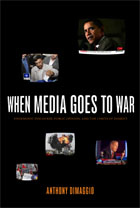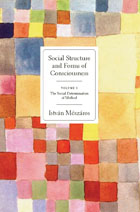



ANTONIO GRAMSCI by Antonio A. Santucci
BUY THIS BOOK

WHEN MEDIA GOES TO WAR: Hegemonic Discourse, Public Opinion, and the Limits of Dissent by Anthony DiMaggio
BUY THIS BOOK

HUMANITARIAN IMPERIALISM: Using Human Rights to Sell War by Jean Bricmont
BUY THIS BOOK

FOOLS’ CRUSADE: Yugoslavia, NATO, and Western Delusions by Diana Johnstone
BUY THIS BOOK

BEHIND THE INVASION OF IRAQ by The Research Unit for Political Economy
BUY THIS BOOK

UNDERSTAND-
ING THE VENEZUELAN REVOLUTION: Hugo Chavez Talks to Marta Harnecker by Hugo Chavez and Marta Harnecker
BUY THIS BOOK

CHE GUEVARA: His Revolutionary Legacy by Olivier Besancenot and Michael Löwy
BUY THIS BOOK

THE TAMING OF THE AMERICAN CROWD: From Stamp Riots to Shopping Sprees by Al Sandine
BUY THIS BOOK

SOCIAL STRUCTURE AND FORMS OF CONSCIOUS-
NESS by István Mészáros
BUY THIS BOOK
Interview with Arshin Adib-Moghaddam
by Maxim Momot
In your view, does the combat troop withdrawal mean that the mission has been completed successfully?
Viewed from all conceivable angles the war must be considered a strategic failure and a humanitarian disaster. True, the US government, together with its allies primarily the United Kingdom, managed to oust Saddam Hussein who was, by all standards available, a tyrannical dictator. This was the immediate aim and a part of the pre-emption strategy that was adopted by the United States in the aftermath of the terror attacks on 9-11. But the strategic goal to turn Iraq into a pro-US ally with democratic contours through a war that started with a devastating 'shock and awe' campaign was flawed from the outset, a concoction of right-wing scholars and neo-conservative ideologues that was devoid of realistic calculation. Conservative estimates by Iraq Body Count put the number of Iraqi civilians killed at around 100.000. The highly respected scholarly medical journal The Lancet put the number far higher -- over 654.000 in 2006, amounting to 2.5% of the overall population of Iraq. Add to that the millions of Iraqi refugees who are living a destitute life in refugee camps, the hundreds of thousands of orphaned children and widowed women, and the true cost of the war for Iraqi society becomes rather more apparent. In addition, conservative estimates put the number of US combat troops killed at 4.415 while 179 British military personnel have lost their lives since the war, most of them were between the ages of 20-29. Undoubtedly, the reintegration of the psychologically and physically scarred military personnel who will return from duty will have its own human and material costs, which will top the price tag for the war estimated at about 750 billion US$ or 60 times Iraq's GDP in 2003.
All of this did not deliver peace and stability in Iraq and the wider Persian Gulf area, but the opposite. It has now become common knowledge that there were no WMD in Iraq, that Saddam Hussein did not collaborate with al-Qaeda in any meaningful way. Al-Qaeda in Iraq, the organisation that routinely bombs Shia mosques, police headquarters, markets and other public and civilian places only emerged after the invasion, taking advantage of the anarchy unleashed after the war. Moreover, the most recent elections in Iraq failed to produce a viable government, and it is not US delegates that act as consultants to the main Iraqi politicians, but Iranian ones.
I don't think that for the majority of Iraqis and maybe even the majority in Europe, the Muslim worlds and beyond, it will be the image of Saddam Hussein's statue being dragged down by US tanks that will be remembered. But the image of the sexually humiliated and tortured Iraqi inmates of the Abu Ghraib prison complex.
It is officially stated that the US troops who will stay in Iraq until 2011 will not be engaged in military operations. Is it possible or is it a kind of wishful thinking?
We shouldn't forget that President Obama's announcement declaring the end of 'combat operations' in Iraq is the second 'official end' to the war. George W. Bush announced as early as in March 2003 that 'major combat operations in Iraq have ended' and that from now on the 'coalition is engaged in securing and reconstructing that country'. Through the rhetoric of the return of combat troops, President Obama wants to fulfil one of his major campaign promises, but it is improbable that US troops will not be engaged in small-scale military operations. Having said that, their capacity to launch wider strategic operations is curtailed and the US Army is likely to rely more extensively on reconnaissance missions, intelligence operations, or targeted bombardments with unmanned drones comparable to operations in Afghanistan/Pakistan.
The US pledged to remove all American troops by the end of 2011. What will be after 2011? Will the prediction of Iraq's government collapse come true? Maybe it would be better for the US troops to stay in Iraq after 2011?
A part of the insurgency was fuelled by the presence of US troops in the country. Iraqi nationalists recruited in the name of a 'national liberation' war against the 'imperial' enemy and al-Qaeda type movements called for a 'holy war' against the 'crusading infidels'. The withdrawal of US troops is likely to make it more difficult for some of these groups to propagate their agenda.
The past seven years have shown that the presence of US troops didn't really pacify Iraq. Even after the surge the terrorist attacks were merely subdued, never really extinguished. It is central to the viability of the Iraqi state to be perceived to act sovereign and not under the dictate of any country. The withdrawal of US troops, which will not be complete for some time to come, could function politically and ideologically to that end.
Operation Iraqi Freedom resulted in 5 million refugees and at least one hundred thousand civilian casualties. Iraq is obviously a failed state. Maybe it would have been better for Iraq to have Saddam as its leader up to now?
The answer to this will be given in Iraqi history books. I am sure that for Iraqi parents, it doesn't make a difference if their children were/are killed and maimed by Saddam Hussein's regime, US troops or al-Qaeda terrorists. What is by far more important is that US foreign policy towards the country since 1991 has contributed to the suffering of Iraqis as much as, if not more than, Saddam's regime. There are no winners and losers in wars, just devastated lives on all sides. We shouldn't forget that after 1991 Iraqi sovereignty was seriously curtailed and that the policy of sanctions, intermittent bombardment etc. weakened the ability of Iraqi civil society to combat Saddam Hussein when he was in power.
Has the US learned a lesson from Iraq war? Will there be any new regime change operations or have US policymakers understood the complexity of such endeavours?
If there should be one thing that the Iraq war taught us, it is that history cannot be monopolised, wars cannot create nations, and liberty does not come about with the force of the bayonet. I think that President Obama understands that the kind of grand-scale wars that the Bush Administration launched in Iraq and Afghanistan seriously jeopardised the United States' standing in international politics, which is why he stresses soft power over hard military power, for instance in US foreign policies toward Iran. Having said that -- and I have expressed this more systematically in my book Iran in World Politics: The Question of the Islamic Republic -- US neo-conservatism is a virulent ideology that continues to be a fundamental part of the contemporary political culture in the United States. The same figures who advocated the war against Iraq today agitate against Iran, Venezuela, Brazil, Turkey, Cuba, 'old' Europe, China and Russia.
The electorate in the United States voted against McCain who advocated war against Iran, opting for the diplomatic and conciliatory rhetoric of Obama instead. But I think the threat of another war persists, as long as neo-conservative ideology continues to have an impact on the political process in the country. Alas, the right wing never really sleeps and it is plotting for a post-Obama future at the very moment I am writing these lines.
Arshin Adib-Moghaddam's newest book, A Metahistory of the Clash of Civilisations: Us and Them beyond Orientalism, will be published by Columbia and Hurst in November 2010. This interview was conducted by Maxim Momot for Novoye Vremya/The New Times (Russia) on 24 August 2010, an excerpt from which was published in Novoye Vremya/The New Times on 30 August 2010.











